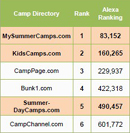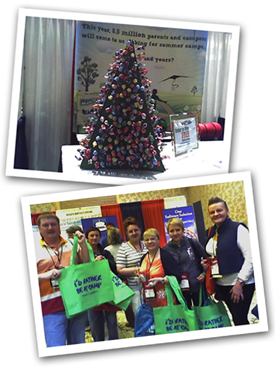by Phillip Gilbreth, Camp Sales Manager for MySummerCamps and KidsCamps
 Leading independent traffic measurement tools (Alexa.com, Compete.com and TrafficEstimate.com) support the fact that MySummerCamps.com and KidsCamps.com are the most visited camp related websites on the Internet, outperforming every other online camp directory in a head-to-head comparison throughout the year.
Leading independent traffic measurement tools (Alexa.com, Compete.com and TrafficEstimate.com) support the fact that MySummerCamps.com and KidsCamps.com are the most visited camp related websites on the Internet, outperforming every other online camp directory in a head-to-head comparison throughout the year.
Click here to see a detailed comparison of the top online resources for the camping industry.
Alexa.com offers a compelling reflection of this exceptional performance. Alexa.com provides a measure of a site's popularity by combining their average daily visitors and page views over the past 3 months and ranking it against other sites on the Internet. Much like the New York Times Bestsellers list, the closer the ranking is to #1, the more popular the Web site.
MySummerCamps.com and KidsCamps.com rank significantly higher than their competitors, proving their status as the leaders in the camp marketing industry.

 Search engine optimization (SEO) is the practice of strategically modifying the content on your Web site so that search engines can find and present your site to its users. For example, if you operate a basketball camp in New York, using SEO techniques will help parents who do a general search on Google for "basketball summer camps in New York" to find your specific camp among the top search results.
Search engine optimization (SEO) is the practice of strategically modifying the content on your Web site so that search engines can find and present your site to its users. For example, if you operate a basketball camp in New York, using SEO techniques will help parents who do a general search on Google for "basketball summer camps in New York" to find your specific camp among the top search results.
 Camp enrollment
season has begun and your recruitment efforts are in full swing. Your
listings on
Camp enrollment
season has begun and your recruitment efforts are in full swing. Your
listings on